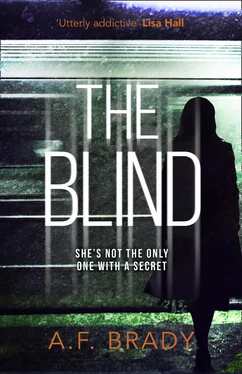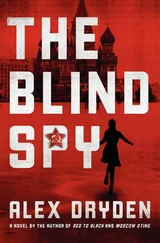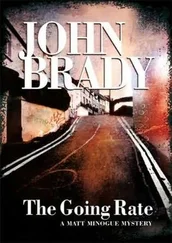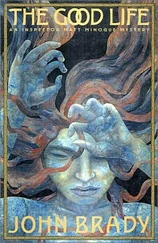It feels fraudulent and silly and sometimes even comical, but I’m not any different from anyone else here. The clinicians are supposed to instill hope. We’re supposed to take our talents and patience and hard-earned degrees and apply our education to the betterment of others. We pride ourselves on having it all together. We fancy ourselves the shepherds. We are told that this is noble and upstanding work, and a benefit to society. But it’s all a pile of shit. We’re no different from them. There’s no line in the sand. In the end, we don’t have canyons that divide us. We barely have a fissure. I have a key and an office and they don’t. I came here to save them; they can’t save me. But sometimes, the lines get blurred. People say “If you can’t do, teach.” Well, if you can’t save yourself, save someone else.
There is a new patient starting this week. No one wants to work with him. His file is nearly empty, and the rumors churning among the staff have been filling in the blanks with horror stories and nonsense. (He murdered his last counselor; he refuses to do paperwork; he’ll be a nightmare patient.) Even I don’t want to work with him, and I’m the one who takes all the patients no one wants. No one really knows what he’s all about; what’s true, what’s a rumor. He has one of those charts where nothing is clear. He obviously hadn’t answered the questions during the psychosocial evaluations. Most of what was written was garnered from his physical appearance and intake materials. He was definitely in prison; those records are clear. For twenty-some years, although somehow the charges aren’t written in his file. Then halfway houses for years after prison. And now he’s mandated to treatment as a condition of his probation.
We take so much of our power for granted; it only really exists because our patients aren’t aware of their ability to fight against it. And then this guy comes in and starts unsettling everything. I guess I respect him, in a way. I had been napping in my office hoping that something would change, and I guess this guy may be the one to change it.
“Okay, guys, what does hereditary mean?” I’m running a group counseling session. This is a psychoeducational group, so I’m supposed to be helping my patients understand their diagnoses. So often psychiatrists will tell a patient that he or she has something and then never explain in plain English what it means.
“It means it runs in your family, right?” This is Tashawndra. She had eleven children. Every single one of them has been removed from her custody by social services. She isn’t sure of the whereabouts of most of them, and she believes that two of them are dead, but isn’t positive. This is her reality.
“That’s exactly right—it means there is a genetic component. So which mental illnesses have a genetic component?” I’m up on top of the desk, where I usually sit.
“Cancer. My mom had breast cancer and I had to go get checked for it because she had it, but I didn’t have it.” Lucy.
“That’s right. Cancer has a big genetic component to it, so it’s important to get checked out if someone in your family has it. But what about mental illnesses? What about the kinds of things we treat here?”
“All of ’em, right? I know that if your parents or your brother is addicted to drugs that you will probably get addicted to drugs, too. And people here are getting treated for that. You treat drug addicts here. And sometimes, if your family is depressed, you could get depressed, too.” Tashawndra.
“Yeah, that’s a big one,” I say, wagging my finger in her direction. “Depression has a genetic component. So does schizophrenia, bipolar disorder and many of the other problems we treat here.”
“So you’re fucked, huh? If your mom is schizophrenic, then you can’t stop it from happening to you, huh? It’s like you’re born fucked over. You’re born to be crazy, right? Ha, like ‘Born to Be Bad,’ that song? Born to be crazy.” Tyler. Tyler has schizophrenia. At twenty-two years old, he’s very advanced for his age. He seems to have a greater understanding of the world that the rest of us missed somehow. He’s at peace with things that the rest of us struggle with. Tyler has forgiven.
“Well, no, not always. And watch your language. When you have a genetic predisposition, which means when someone in your family has a disorder, then sometimes you will get it and sometimes you won’t. It depends on what else happens in your life. It depends on whether or not you are exposed to things that will help you stay well, or things that will make you get sick.” I’m bouncing my heels off the front of the desk.
“What kind of stuff makes you sick? Like drugs and stuff?” Tyler. “Because I know my brother did drugs in school with his friend, and then he was crazy after that. He got locked up but he was crazy, man. He never acted like that before he did those drugs.”
“Drugs, sure. That’s a significant one, actually.” I’m nodding and explaining, bright-eyed. “Also, poverty, abuse, growing up without both parents, not being able to get enough food or go to school. They are kind of like strikes against you. So, if you have the gene in you to get depression or schizophrenia, and then you have these strikes in your life, too, you could end up with the diagnosis.”
“Like three strikes, you’re out, right?” Tyler. He and I talk baseball in the hallways. I’m afraid of running into him one day at Yankee Stadium.
When it’s almost time to go home, I start to look at all the things I’ve been avoiding all day. I don’t have a drink or a cigarette with me to help me look at these things, but I start to peer into the abyss anyway.
I know when I get home and I am alone, and my phone isn’t ringing, I’ll be looking at this, so I may as well get it started now. Maybe it will ease the burden. Maybe I won’t cry so hard when I’m at home. Inevitably, the only thing that happens is I am going to be forced to wear sunglasses on the train home because my face will be swollen with misery and my eyes will be brimming with tears that somehow, every single day, manage to cling to my eyelids until the very second my apartment door swings open.
It didn’t always feel like this. Sometimes things made sense. Back when I felt like I understood what was going on, and I wasn’t just going through the motions.
The subway is down. There is a fire on the tracks on the A/C Line, and I have to get off the train a hundred blocks from my apartment. For whatever reason, I am walking now. I tend to think when I walk, which is probably not a good thing, because I don’t have any cash and I can’t stop somewhere for a drink to help me stop thinking.
It’s cold out. The kind of cold that makes your knees hurt and your lips get solid, so it’s hard to talk. My eyes are watering, but I’m not crying. I’m smoking back-to-back cigarettes, and I don’t have gloves, so I have to keep switching hands.
Even though it’s freezing, there are families out in the street. I’ve seen them since I got off the train. There is a mother pushing a stroller on the other side of the street, and we have been pacing each other for blocks. She looks like me. Well, she looks like my mom, and I guess I look like my mom, too. We’re blonde, and I’m guessing the woman has blue eyes like we do, even though I can’t see that far. She’s small, like my mother is. I’m much taller than they both are; I always thought my dad must have been a pretty big guy. Now I’m stuck thinking about my own family as I walk south in this bitter city.
Читать дальше












